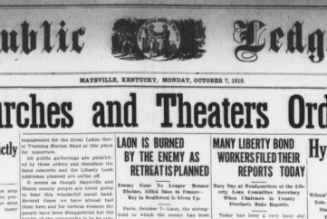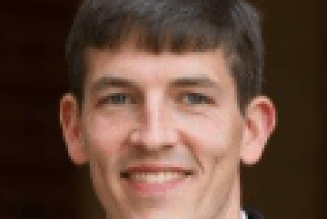
.- Chatting with Lee McDowell is a peaceful experience.
Seated in a comfy leather chair in a rust-colored office near downtown Denver, McDowell serenely and thoughtfully explains the “art and science” of her particular trade – and it’s not surprising to learn that she has a background in clinical psychology.
Today, McDowell serves not as a psychologist, but as one of many spiritual directors available to Catholics and other Christians through the Lanteri Center for Ignatian Spirituality in Denver, Colorado. The center is a house founded by the Oblates of the Virgin Mary, with the mission of bringing spiritual direction to the “popular level” of parishes and lay people.
Once thought to be reserved for the “interior castles” of highly mystical souls like St. Teresa of Avila, spiritual direction is today increasingly popular among Catholics of all vocations in the post-Vatican II age of emphasizing the universal call to holiness.
“As she has never failed to do, again today the Church continues to recommend the practice of spiritual direction,” Pope Benedict XVI said in 2011, “not only to all those who wish to follow the Lord up close, but to every Christian who wishes to live responsibly his baptism, that is, the new life in Christ.”a
But good spiritual directors can be hard to find, and it can be difficult to know when one needs spiritual direction, versus a good confession or pastoral counseling or other kinds of help.
CNA posed some questions about the ministry to some seasoned spiritual directors and experts on spiritual direction: McDowell, a Catholic convert and former clinical psychologist who found spiritual direction through her grief after losing her husband; Fr. Greg Cleveland, an oblate of the Virgin Mary and executive director of the Lanteri Center; John Johnson, the associate director of the Avila Institute for Spiritual Formation; and Dr. Anthony Lilles, Academic Dean of both St. John’s Seminary in Camarillo, California, and the Avila Institute for Spiritual Formation, who has written extensively on the spiritual life.
What is spiritual direction – and what is it not?
While the answers from spiritual directors and experts vary slightly on this question, one thing is clear – spiritual direction must be aimed at forming and cultivating a relationship with the Lord.
“One of my favorite definitions for spiritual directions is that it is a three-part encounter,” McDowell said. “An encounter between the Lord, the directee, and the spiritual director, for the purpose that the directee may grow in their relationship with our Lord.”
Remove any one of those encounters, and what is taking place is no longer spiritual direction, McDowell said.
Spiritual direction is also distinct from other forms of pastoral help or counseling, Cleveland told CNA.
“Spiritual direction is not pastoral counseling, a lot of people mistake it for that,” Cleveland said. “Pastoral counseling is more about solving problems in a person’s life, and that’s certainly important and very much needed.”
It’s also not confession, Johnson noted.
“It’s very important that spiritual direction is distinguished from confession. Confession is for your sins, and that doesn’t need to be very illustrative. Confession is number and occasion (of sin),” he said. “If you confess all your sins, you express remorse, you have contrition, and you vow to do satisfaction…you have a good confession, you get absolution. It doesn’t need to be a laundry list.”
Spiritual direction instead focuses on a relationship with God, Cleveland said, which is “not a problem to be solved, but something to be discovered and deepened and celebrated. A lot of times people are looking for something else…so sometimes we have to really reorient someone’s thinking – are you looking to deepen your relationship with God through prayer and discernment?”
Johnson told CNA that spiritual direction is a helping relationship that allows Christians to achieve sanctity and the heights of contemplation – which are for every Christian, and not just an elite few.
The practice has biblical roots, Johnson noted, such as in Acts 8:27-39 in which an Ethiopian eunuch is travelling and reading Scripture, but does not fully understand the passage he is reading.
“Seated in his chariot, (the eunuch) was reading the prophet Isaiah. The Spirit said to Philip, ‘Go and join up with that chariot.’ Philip ran up and heard him reading Isaiah the prophet and said, ‘Do you understand what you are reading?’ He replied, ‘How can I, unless someone instructs me?’ So he invited Philip to get in and sit with him.” (Acts 28-31).
In the rest of the passage, Philip reads the Scripture passage with the eunuch and “proclaimed Jesus” to him by teaching him about the passage, and then baptizing him.
Lilles emphasized that spiritual direction is not just another self-improvement program.
“It’s not psychological counseling for example, nor is it self-exploration or self-improvement or self-therapy,” he said.
“There might be a therapeutic dimension to it, and of course self-knowledge allows you to have a deeper knowledge of God, but is about a living encounter with the Lord. What obstacles do I need to remove so that that encounter can unfold in my life? What do I need to do to dispose myself for that encounter so that I’m ready to say yes to what God places in my heart?”
Who needs spiritual direction? Is it for everyone?
“The first thing that we could say about a spiritual director is that everybody needs one,” Johnson said.
It’s a point on which not everyone in the world of spiritual direction and formation completely agrees. But for Johnson, the biblical roots of spiritual direction confirm its necessity in the spiritual life.
“In this culture of self-starters, of bootstrappers, we hear a lot this notion of ‘well I taught myself.’ How’d you learn that language? I taught myself. How’d you learn ballet? I taught myself. Well that’s not true, because if you could teach yourself anything, you wouldn’t need to,” Johnson said.
“So we need a guide, and beginning in the Biblical tradition even in the earliest days, the apostles introduce one another to Christ. This is the normative way that sanctity is achieved.”
For Father Cleveland, the desire for spiritual direction is key. The average person who identifies as Catholic but may not pray regularly or seek out the sacraments is probably not going to be interested in a spiritual director, he said.
McDowell said that while every Christian who is serious about their faith could benefit from spiritual direction, she didn’t believe formal spiritual direction with a trained religious or lay director was always necessary – or practical – in the spiritual life.
People early on in their faith journey might benefit more from bible studies or other small groups at first, rather than diving right into spiritual direction, she noted.
But there are times in a person’s life when spiritual direction might be more beneficial, she said, such as times of transition – whether that’s vocational discernment, transitioning from college to the real world, a midlife crisis, retirement and empty nesting, or other life changes.
Another time when spiritual direction is especially helpful could be when a person experiences something unexpected, usually something painful like the loss of a job, a dream or a loved one, McDowell said.
“Unexpected sufferings, are marvelous times and often needed times for the ministry of spiritual direction,” she said.
Lilles said there are three key times when he thinks spiritual direction is most needed in a person’s life: when someone has become “spiritually lazy” and needs to reignite their spiritual life, when someone experiences a traumatic event due to their own sin, the sin of others or an outside event, and when someone experiences some internal spiritual trial that may or may not be related to external events.
“When some kind of crisis of faith has come it would be good to seek someone out,” he said.
Where can good spiritual directors be found?
A good spiritual director can be hard to find. Isolated geographic locations, a shortage of vocations to the priesthood and religious life, and the already-busy schedules of available spiritual directors are some of the reasons someone might have difficulties finding a qualified person.
Johnson said he recommends that people find the holiest person they know, and ask them who their director is.
“It’s easy to say my parish is terrible and my priest is too busy…but you have to keep looking. Because the best spiritual directors are going to be very hidden,” he said. “If you see a billboard that says call me, 1-800 Spiritual Director, run the other way.”
Johnson and Lilles both recommended spending some times at local monasteries or convents with religious who are faithfully living out their vows, and asking them for spiritual direction.
“Where the discipline of the Christian life is being lived, God always raises up people who have wisdom for the spiritual life,” Lilles said. He added that most parish priests should also be able to recommend spiritual directors to their parishioners.
As with everything in the spiritual life, prayer is a key component of finding a good spiritual direction.
“The most important thing to find a spiritual director is to beg God to send you one, and God will send you the spiritual director you need at the right time in your life, he hears those kinds of prayers,” Lilles said.
Are all priests spiritual directors? Can lay people be spiritual directors?
While most priests have some sort of training in giving spiritual counsel, they often need further formation to become a well-trained spiritual director, Cleveland said.
“The traditional thinking was that priests were automatically qualified by virtue of their training to be spiritual directors, but it all depends on how good their training is,” he said.
“Priests may have that gift but that gift needs to be developed, like any talent we have,” he added. “Somebody could be a born athlete but they would still have to practice and become good at the sport that they play, and its like that with the priesthood as well.”
There are several formation programs that help develop priests and religious as spiritual directors, and these are increasingly open to interested and qualified lay people as well. Both the Avila Institute and the Lanteri Center providing spiritual direction formation for priests and laity.
Lay people, when given the proper formation and training, “make excellent spiritual directors,” Cleveland said.
“Sometimes the life experience of one lay person receiving spiritual direction will be more consonant and similar to the lay person who’s giving spiritual direction… (they) may find that another lay person understands and is able to relate to (their) experience of being a layperson in the world,” he said.
McDowell, herself a lay spiritual director, said that she finds that people seek lay spiritual directors for a variety of reasons – their priest is busy, they want to talk to someone who might share their vocation of marriage, or they are a woman who would rather share intimate spiritual details of their life with another woman, rather than a priest.
The key qualifications for any good spiritual director are spiritual maturity, psychological maturity, and self awareness, McDowell added. These people can then enter into formation as spiritual directors, where they delve more deeply into the spiritual life, the discernment of spirits, and the ability to listen deeply to another person and notice where God might be moving in their life.
What happens at spiritual direction? What do the directee and the director bring to the table?
At the Lanteri Center, spiritual directors are taught to listen to their directees and to help facilitate their relationship with God, rather than present themselves as gurus who have all the answers, McDowell said.
“My facilitation is mostly asking questions, sometimes repeating back to them a word or phrase that they have said and asking them to say more about that,” McDowell said.
“I don’t suggest: ‘I believe God wants you to do this.’ We are not directive in that way. There’ll be times when I may have a sense that God is working in a particular way in a directees life, but one of our cardinal maxims so to speak is never get out in front of God,” she said.
“So even though I may have a sense that he is working in a particular way or has a desire for the directee in a particular area of holiness and growth, my suggestion will be – how about praying with this scripture. Or if they’ve been praying with it, to journal about it. That’s what I will do, that’s what I mean by facilitating.”
As for what the seeker of spiritual direction brings to the table, a desire for and commitment to a prayer life is key, McDowell said.
“Without their own personal prayer, there’s really no reason to get together,” McDowell said. “Now, some people come and they want to be taught how to pray. That’s beautiful and we can do that.”
Once people begin with spiritual direction, Cleveland said he usually recommends they spend at least half an hour a day in prayer, whether that’s meditating on scripture, praying the examen prayer, spending time in front of the Eucharist or other forms of prayer.
Johnson said his recommendation to people just beginning spiritual direction is “to bring themselves.”
“At first you especially want to try to get to the heart of the matter, and that can be the most prevalent place of pain in your life, that can be your heaviest cross, that can be your darkest memory,” he said, “because in many ways these crosses, these trials impress themselves upon us in a way that’s very formative or de-formative and that might be the place to start, the most difficult place.”
“Each of us is deeply broken, and if we weren’t deeply broken we wouldn’t need any direction,” he added. “It’s like when you go to the doctor, what are you going to do? It’s not like you’re going to tell them about things that aren’t bothering you. You’re going to tell them about what’s hurting so he can fix it. That’s what a director does, that’s the quality of a good physician.”
What happens if a spiritual director is not a good fit?
McDowell said both the spiritual director and directee should always be discerning whether the relationship is a good fit.
At the Lanteri Center, people seeking spiritual direction are encouraged to have an initial interview meeting with one of the available spiritual directors, and to read their biographies online to see if they feel called to meet with any particular person.
McDowell said she never assumes at a first meeting that she will be that person’s spiritual director, she rather uses the time to gauge where the person it at and what they need.
“Our first meeting with a potential or prospective directee is what we call an initial interview…where I’ll tell them what spiritual direction is and is not, I’ll ask what their desires are and what has brought them,” she said.
It is then up to both the director and directee to discern whether they are a good fit, or whether another person or another ministry altogether might be needed. McDowell said she has referred people to priests for pastoral matters, and directors at the Lanteri Center are also able to recommend Christian psychological counselors if they discover that that is what a person might need.
Sometimes a spiritual direction relationship reaches a natural end – a person may enter a new phase of life or prayer that necessitates a different spiritual director. Prayerful discernment and honesty are key, McDowell said.
For example, as a convert to Catholicism, McDowell said if she had directees who desire to delve more deeply into the lives of the saints, she will usually refer them to a different director, since she is not as familiar with this particular tradition.
“So that’s another time where it’s really good to discern,” McDowell said. “Maybe we’ve been together, and it’s been really good, but now there’s someone else to take them on the rest of the journey.”
What can Catholics do if they still can’t find a good spiritual director?
There are many resources on spiritual direction available to those who desire spiritual direction but who cannot find a formal director.
Cleveland recommended the many books by Father Timothy Gallagher, another Oblate priest, who is most well-known for his book “Discernment of Spirits”, as well as his other spiritual works such as “The Examen Prayer,” and “Discerning the Will of God.”
In his video for Ascension Press entitled “No spiritual director? No problem!” Father Mike Schmitz makes several book recommendations. Besides “Discernment of Spirits,” he also recommends “Time for God” by Father Jacques Philippe, “Deep Conversion, Deep Prayer” by Father Thomas Dubay, and the “Introduction to the Devout Life” by St. Francis de Sales.
Whether people are in spiritual direction or not, Lilles said he recommends that people who want to grow in their spiritual lives read more about the doctors of the Church.
“Since 1972 the church has raised up doctors of the Church – St. Catherine of Siena, St. Teresa of Avila, St. Therese of Lisieux, St. Hildegard of Bingen, St. John of Avila, St. John of the Cross, and more recently St. Gregory of Narek..these doctors of the Church have all written about the spiritual life, they all have spiritual wisdom,” he said.
“They are masters of the spiritual life…this is an important time for rediscovering that spiritual teaching,” he added.
“Don’t be afraid to put out into the deep, as St. John Paul II often exhorted us” Cleveland added.
“Don’t be afraid to try to deepen that relationship with God, to seek the Lord through prayer and through living the spiritual life vibrantly. It’s a commitment, but the rewards are tremendous – to have that relationship with God, to know God’s presence not only in prayer but in the midst of my daily life, and to be able to seek and find God in all things.”
This article was originally published on CNA Aug. 31, 2018.
Join Our Telegram Group : Salvation & Prosperity









